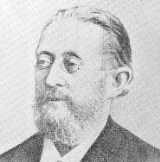
Louis Lewandowski
Encyclopedia
Louis Lewandowski was a German composer of synagogal music.
 Lewandowski was born at Wreschen
Lewandowski was born at Wreschen
, province of Posen
, Prussia
(now Września
in Poland
). At the age of twelve he went to Berlin
to study piano and voice, and became solo soprano in the synagogue. Afterward he studied for three years under A. B. Marx and attended the school of composition of the Berlin Academy. There his teachers were Karl Rungenhagen and Eduard Grell. After graduating with high honors, he was appointed in 1840 choirmaster of the Berlin synagogue. In that capacity he rendered invaluable services in the development of music for synagogue ritual. His principal works include: "Kol Rinnah u-Tefillah," for chorus; "Todah ve-Zimrah," for mixed chorus, solo, and organ; 40 psalms, for solo, chorus, and organ; symphonies, overtures, cantatas, and songs.
In 1866 he received the title of "royal musical director." Shortly afterward, he was appointed choirmaster in the Neue Synagoge, Berlin, for which he composed the entire musical service. His arrangements of ancient Hebrew melodies
for choir, cantor, and organ are considered masterly productions, characterized by great simplicity and a profound religious sentiment. Many of Lewandowski's pupils became prominent cantors. Lewandowski was the principal founder of the Institute for Aged and Indigent Musicians, an institution that prospered under his management.
Lewandowski died in Berlin in 1894. He and his wife Helene are buried in the Weißensee Cemetery
. On their gravestone is inscribed: "Liebe macht das Lied unsterblich!" (Love makes the melody immortal!)

Kreis Wreschen
Kreis Wreschen was a county in the southern administrative district of Posen, in the Prussian province of Posen. It presently lies in the eastern part of Polish region of Greater Poland Voivodeship.-History:...
, province of Posen
Posen District
Posen was the southern of two Prussian administrative regions, or Regierungsbezirke , of the Grand Duchy of Posen and its successor, the Province of Posen...
, Prussia
Kingdom of Prussia
The Kingdom of Prussia was a German kingdom from 1701 to 1918. Until the defeat of Germany in World War I, it comprised almost two-thirds of the area of the German Empire...
(now Września
Wrzesnia
Września is a town in central Poland with 28,600 inhabitants . It is situated in the Września County, Greater Poland Voivodeship , previously in Poznań Voivodeship , on the Wrzesnica River.- History :...
in Poland
Poland
Poland , officially the Republic of Poland , is a country in Central Europe bordered by Germany to the west; the Czech Republic and Slovakia to the south; Ukraine, Belarus and Lithuania to the east; and the Baltic Sea and Kaliningrad Oblast, a Russian exclave, to the north...
). At the age of twelve he went to Berlin
Berlin
Berlin is the capital city of Germany and is one of the 16 states of Germany. With a population of 3.45 million people, Berlin is Germany's largest city. It is the second most populous city proper and the seventh most populous urban area in the European Union...
to study piano and voice, and became solo soprano in the synagogue. Afterward he studied for three years under A. B. Marx and attended the school of composition of the Berlin Academy. There his teachers were Karl Rungenhagen and Eduard Grell. After graduating with high honors, he was appointed in 1840 choirmaster of the Berlin synagogue. In that capacity he rendered invaluable services in the development of music for synagogue ritual. His principal works include: "Kol Rinnah u-Tefillah," for chorus; "Todah ve-Zimrah," for mixed chorus, solo, and organ; 40 psalms, for solo, chorus, and organ; symphonies, overtures, cantatas, and songs.
In 1866 he received the title of "royal musical director." Shortly afterward, he was appointed choirmaster in the Neue Synagoge, Berlin, for which he composed the entire musical service. His arrangements of ancient Hebrew melodies
Hebrew Melodies
Hebrew Melodies is both a book of songs with lyrics written by Lord Byron set to Jewish tunes by Isaac Nathan as well as a book of poetry containing Byron's lyrics alone. It was published in April 1815 with musical settings by John Murray; though expensive at a cost of one guinea, over 10,000...
for choir, cantor, and organ are considered masterly productions, characterized by great simplicity and a profound religious sentiment. Many of Lewandowski's pupils became prominent cantors. Lewandowski was the principal founder of the Institute for Aged and Indigent Musicians, an institution that prospered under his management.
Lewandowski died in Berlin in 1894. He and his wife Helene are buried in the Weißensee Cemetery
Weißensee Cemetery
The Weißensee Cemetery is a Jewish cemetery located in the neighborhood of Weißensee in Berlin, Germany. It is the second largest Jewish cemetery in Europe. The cemetery covers approximately and contains approximately 115,000 graves. It was dedicated in 1880....
. On their gravestone is inscribed: "Liebe macht das Lied unsterblich!" (Love makes the melody immortal!)
External links
- Louis Lewandowski Festival, Berlin 2011
- Sound Examples

